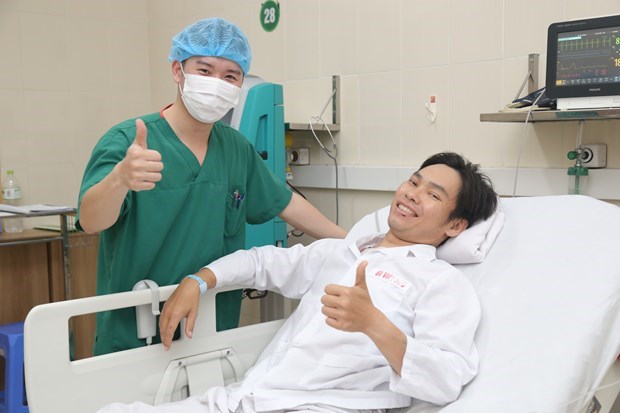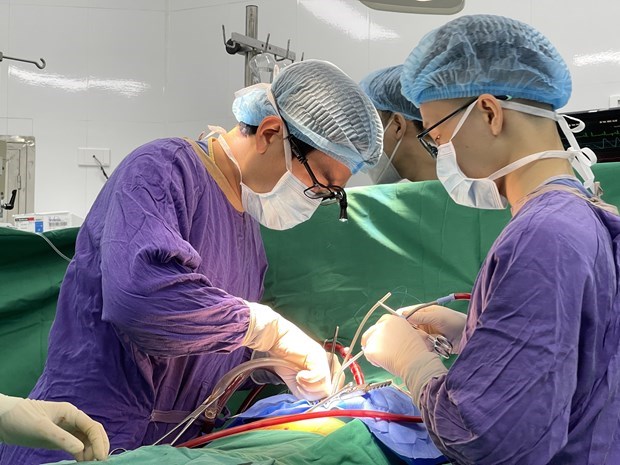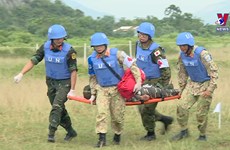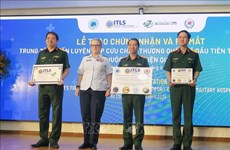Vietnamese doctors successfully perform first heart-kidney transplant
 Doctors of the Vietnam – Germany Friendship Hospital perform the transplant on February 15. (Photo: VietnamPlus)
Doctors of the Vietnam – Germany Friendship Hospital perform the transplant on February 15. (Photo: VietnamPlus)Hanoi (VNA) - The first heart and kidney transplant on one patient in Vietnam was successfully performed on February 15 by doctors of the Vietnam-Germany Friendship Hospital, the hospital announced on February 24.
The transplanted organs were taken from a brain-dead donor.
Associate Professor Nguyen Huu Uoc, director of the hospital’s Cardiovascular and Thoracic Centre, said the patient who received the organs is a 37-year-old man living in the Central Highlands province of Gia Lai. He suffered from dilated cardiomyopathy, heart failure and severe arrhythmias, leading to end-stage renal failure.
He underwent hemodialysis continuously for five to six years and often received emergency treatment at major cardiovascular centres in Ho Chi Minh City and Thua Thien-Hue province.
Due to ineffective treatment, he was instructed by doctors to have a heart and kidney transplant.
In mid-2022, he was introduced to the Vietnam-Germany Friendship Hospital. After careful evaluation, the hospital's experts agreed to perform a simultaneous heart and kidney transplant for the patient with donated organs from a brain-dead donor.
Transplanting both organs at the same time is a big challenge, requiring doctors to be well prepared, Uoc said.
In six months since the transplantation decision was made, no donated brain-dead organ truly matched, and the patient had to continue to visit hospitals for heart and kidney treatment.
In early February 2023, one woman who had a brain death due to a severe traumatic brain injury after a traffic accident donated multiple organs with family consensus.
 The patient after the transplant (Photo: VietnamPlus)
The patient after the transplant (Photo: VietnamPlus)
The transplant surgery lasted for 10 hours from 9am to 7pm on February 15 with the participation of doctors from five centres and clinical departments.
It took the team three hours to take out the organs, five hours to transplant the heart and two hours to transplant the kidney.
“The transplantation was performed successfully thanks to skillful cooperation between heart, kidney transplant and anaesthesia resuscitation technicians as well as careful preparation of medical facilities and advanced equipment,” said Professor Tran Binh Giang, the hospital’s director.
 Vietnam has made great stride in organ transplant. (Photo: VietnamPlus)
Vietnam has made great stride in organ transplant. (Photo: VietnamPlus)
The patient’s heart and kidney recovered fully on February 24, eight days after the transplant.
He can sit up, eat and communicate without special assistance.
He will undergo further post-transplant treatment in the next few weeks.
This was the first time Vietnamese doctors have successfully performed a transplant of heart and kidney organs on one patient.
Vietnamese doctors have performed two organ transplants on one patient three times.
Two years ago, the Vietnam-Germany Hospital doctors conducted a liver and kidney transplant on a patient.
Heart-kidney transplantation technique has been performed in countries with a developed medical system. The US has carried out more than 100 heart-kidney transplants each year.
The Vietnam-Germany Hospital led the country in organ transplants and has performed more than 1,500 of these surgeries.
About 6,500 organ transplants have been carried out in Vietnam since the first in 1992, showing great efforts by the entire health sector, but the figure is still modest compared to other countries, an official has said.
At present, 95% of the transplants in the country use organs from living donors and only 5 per cent from brain-dead donors, which runs counter to the global trend, in which the majority are transplants from brain-dead donors.
In Vietnam, an estimated 10 people die each day while waiting for organ transplants. Meanwhile, it is worrying that less than 30% of doctors and 20% of nurses have gained a sufficient understanding of brain death, and many do not have any knowledge about this.
These are challenges that must be addressed, and the system of 22 organ transplant centres along with hospitals nationwide needs to make changes to encourage brain-dead organ donations, he said.
The National Coordinating Centre for Human Organ Transplants is the first unit in the country to form a list of patients waiting for transplants, and nearly 50,000 people have registered for organ donation after death or brain death./.













